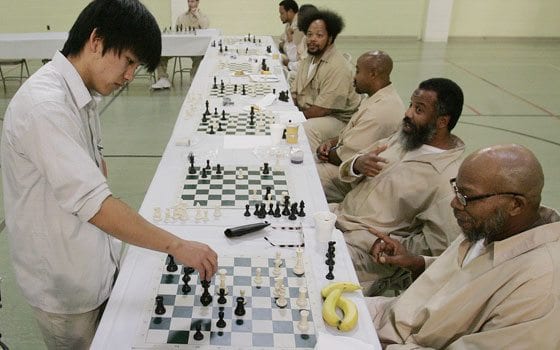
TRENTON, N.J. — David Wang is a young man who’s clearly going places. With a father who studies plant viruses and a mother who is a lab technician, the Princeton University sophomore is gifted with a brilliant mind, a movie-star smile, and a self-confidence he manages to hide behind a humble veneer.
Kelvin Washington is a middle aged man who’s not going anywhere for the next 44 years. A career criminal who spent 29 years behind bars for a string of robberies and burglaries, he has lost contact with his two children, and has had two wives leave him.
Last Wednesday, the two faced off over a chess board inside the gymnasium of New Jersey State Prison, the state’s maximum-security lockup. It was part of an unusual cultural exchange program in which pawns and kings are equal, if only for a few hours each year.
In a tradition that began six years ago, Princeton students travel to the prison in Trenton, 16 miles from their Ivy League campus, and a world away in terms of everything else.
“When I heard about this opportunity, I jumped at it,” said Wang, who has competed three times in worldwide chess tournaments, placing as high as 30th. “It’s not every day you get to go to a maximum-security prison and play against the inmates.”
Chess is big behind bars. Prisons across the nation have thriving chess clubs, some of whom invite outsiders in, others who compete among themselves. The chess club at New Jersey State Prison has 75 members, including inmates serving life sentences for murder, robbery and other heinous crimes.
Washington, a 52-year-old from Long Branch, is six years into a 50-year term for a robbery conviction involving a gas station stickup in West Long Branch. Chess offers him the only type of escape possible these days.
“It eases my mind off the burden of fighting for my life,” said Washington, who, like many of his fellow inmates, insists he was wrongly convicted. “It relaxes me and transports me to another place momentarily. As soon as it’s over, it’s back to business as usual.”
That involves being awakened by corrections officers at 6 a.m., filing into a dining hall for breakfast, and checking a log book to see if he has been granted a pass to go to the law library or the exercise room. If not, it’s back into the cell.
The numbing routine may help explain the popularity of prison chess.
“For one short, sweet moment, I get to be in charge and make my own decisions,” he said. “I get to decide where to move or what not to do. This fight — this nonphysical fight of trying to win at chess is soothing to me.”






